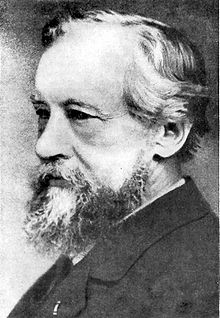Hugo De Vries
Appearance
(Redirected from Hugo de Vries)

Hugo De Vries (February 21, 1848 – May 21, 1935) was a Dutch botanist and one of the first geneticists. He is known chiefly for suggesting the concept of genes, rediscovering the laws of heredity in the 1890s while unaware of Gregor Mendel's work, for introducing the term "mutation", and for developing a saltationist theory.
Quotes
[edit]- Physiologic facts concerning the origin of species in nature were unknown in the time of Darwin. . . The experience of the breeders was quite inadequate to the use which Darwin made of it. It was neither scientific, nor critically accurate. Laws of variation were barely conjectured; the different types of variability were only imperfectly distinguished. The breeders' conception was fairly sufficient for practical purposes, but science needed a clear understanding of the factors in the general process of variation. Repeatedly Darwin tried to formulate these causes, but the evidence available did not meet his requirements.
Quetelet's law of variation had not yet been published. Mendel's claim of hereditary units for the explanation of certain laws of hybrids discovered by him, was not yet made. The clear distinction between spontaneous and sudden changes, as compared with the ever-present fluctuating variations, is only of late coming into recognition by agriculturists. Innumerable minor points which go to elucidate the breeders' experience, and with which we are now quite familiar, were unknown in Darwin's time. No wonder that he made mistakes, and laid stress on modes of descent, which have since been proved to be of minor importance or even of doubtful validity.- Species and Varieties: Their Origin by Mutation (1904), The Open Court Publishing Company, Chicago, p. 5-6
- To put it in the terms chosen lately by Mr. Arthur Harris in a friendly criticism of my views: "Natural selection may explain the survival of the fittest, but it cannot explain the arrival of the fittest."
- Concluding sentence of his work Species and Varieties: Their Origin by Mutation (1904), The Open Court Publishing Company, Chicago, p. 826.

